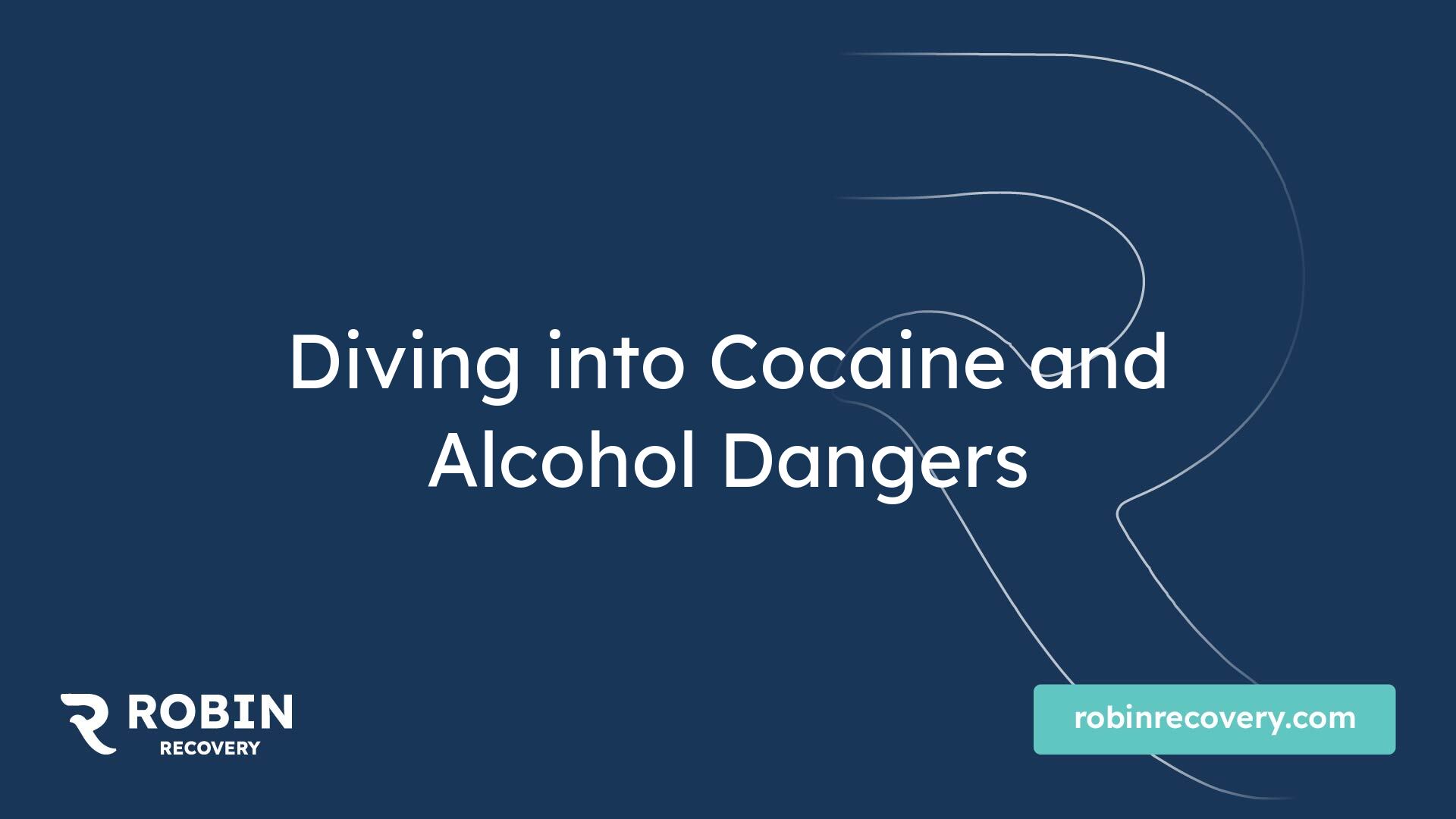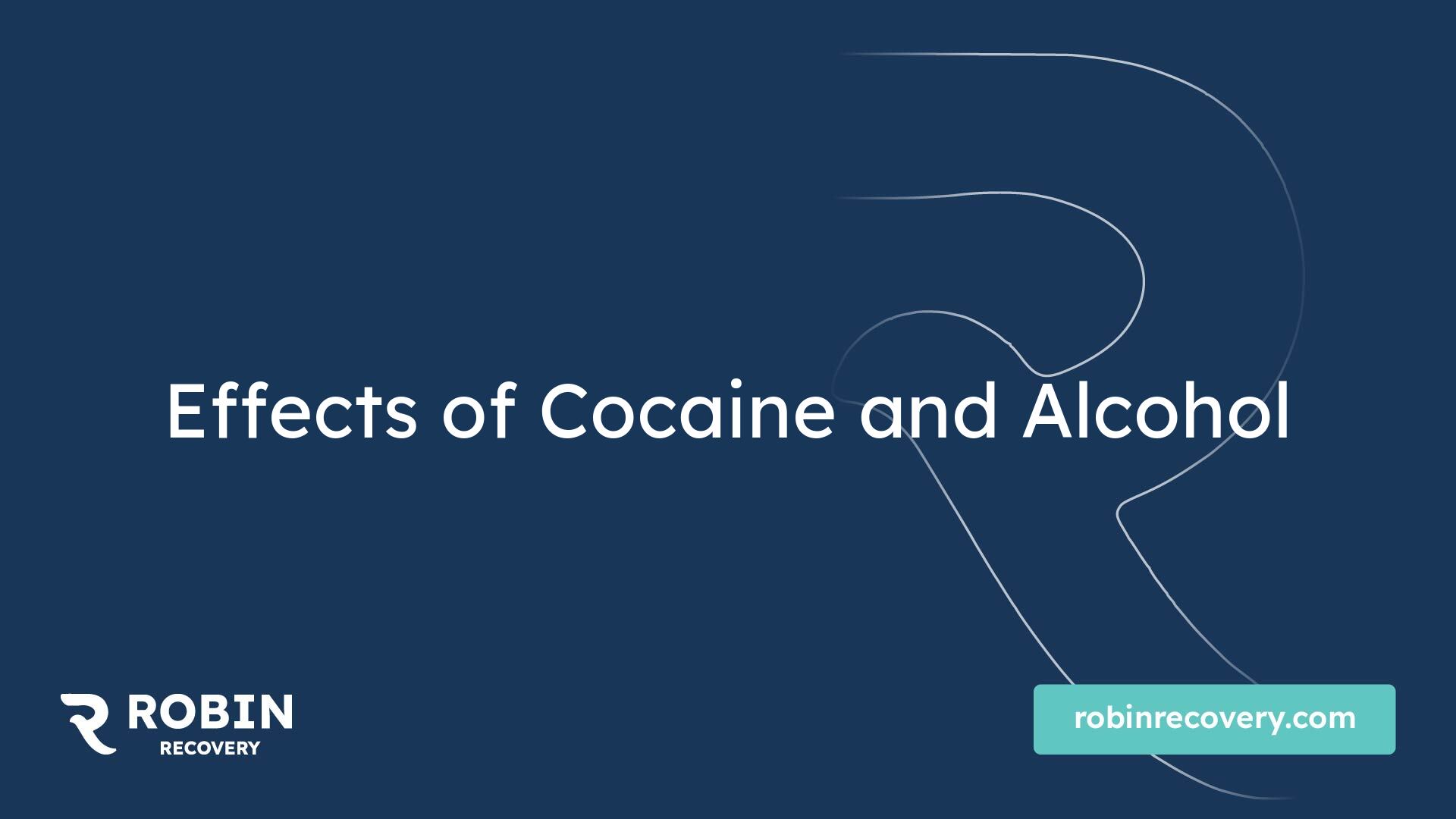Diving into Cocaine and Alcohol Dangers

The Dangers of Substance Abuse
Substance abuse poses significant risks, particularly when it involves the combination of cocaine and alcohol. Understanding these dangers is crucial for promoting awareness and prevention.

Cocaine and Alcohol Interaction
Individuals who struggle with cocaine use disorder often have concurrent issues with alcohol. A striking statistic shows that nearly 60% of those with a cocaine use disorder also struggle with alcohol use disorder [1]. The combination of cocaine and alcohol significantly enhances the risks associated with each drug. Studies indicate that the possibility of sudden death from instances such as heart attacks or strokes multiplies dramatically—18 times higher compared to using cocaine without alcohol.
When alcohol and cocaine are consumed together, the liver produces cocaethylene, a metabolite that is potent and has similar effects to cocaine. This combination not only extends the duration of the cocaine high but also escalates the risks of dangerous cardiovascular effects and cognitive impairments. The negative impacts on intelligence, memory, and verbal learning further complicate the substance abuse scenario, making it crucial for users to acknowledge these risks [1].
Moreover, the presence of cocaethylene increases the likelihood of persistent anxiety and panic attacks, particularly in chronic users of cocaine. This combination amplifies both the psychological and physiological dangers associated with substance use, warranting serious attention from users and healthcare providers alike [1].
Cocaine and Opioid Combining
Cocaine use also poses substantial dangers when combined with opioids. The interaction between these drugs can lead to severe acute effects, including respiratory depression, which significantly increases the risk of overdose. Additionally, the stimulating effects of cocaine can mask the sedative effects of opioids, leading users to consume higher doses of opioids than they might otherwise tolerate, increasing the possibility of overdose.
The combined use of cocaine and opioids can create a more chaotic and unpredictable experience for users, greatly heightening the likelihood of adverse reactions. Notably, individuals who abuse cocaine may also experience withdrawal symptoms from opioids, further complicating their treatment and recovery processes. Understanding the dangers associated with mixing these substances can help educate users on the perils of substance abuse.
Both cocaine and alcohol interactions, as well as the combination with opioids, exemplify the critical need for education around the dangers of cocaine and alcohol. With an awareness of these risks, individuals can make more informed choices and seek help when necessary. For further insights on addiction and recovery, explore topics like the need for drug addicts recovery and what is rehab therapy?.
Effects of Cocaine and Alcohol

The combination of cocaine and alcohol presents significant health risks, influencing various aspects of physical and mental well-being. This section explores the cardiovascular risks, cognitive impairment, and mental health effects associated with this dangerous mix.
Cardiovascular Risks
Using cocaine and alcohol together can lead to severe cardiovascular problems. When both substances are combined, the liver metabolizes them into a byproduct called cocaethylene. This metabolite not only retains the potency of cocaine but also heightens cardiovascular strain. Research indicates that cocaethylene is over ten times more cardiotoxic than cocaine alone, leading to increased heart rate and blood pressure [2].
The risk of heart attack and stroke significantly escalates due to intensified pressure on the cardiovascular system. Individuals may experience abnormal heart rhythms, chest pain, and other serious conditions stemming from this dangerous combination of substances.
Risk FactorDescriptionIncreased Heart RateCocaethylene raises heart rate more than cocaineHigher Blood PressureBoth drugs exacerbate blood pressure levelsGreater CardiotoxicityCocaethylene is more damaging than cocaine alone
Cognitive Impairment
The effects of cocaine and alcohol on cognitive functions are concerning. The combination negatively impacts intelligence, memory, and verbal learning. Chronic users of this mixture may experience difficulties in recalling information and processing new data effectively.
Cognitive impairments can manifest in several ways, including difficulty concentrating, impaired judgment, and slow reaction times. These effects not only hinder personal and professional responsibilities but can also lead to risky behavior while under the influence.
Cognitive FunctionImpactMemoryDeterioration in recall abilitiesLearningImpaired processing of new informationAttentionReduced capacity to focus
Mental Health Impact
The interaction between alcohol and cocaine is also linked to ongoing mental health challenges. The use of both substances can lead to persistent feelings of anxiety and panic attacks, particularly for those who mix them regularly. Cocaethylene can exacerbate these worrying mental health symptoms [1].
Long-term use may result in anxiety disorders, increased depression, and other mental health issues, severely affecting one's overall quality of life. The psychological impact can contribute to a cycle of substance dependence, further complicating recovery efforts.
Mental Health IssueDescriptionAnxietyElevated risk of panic attacksDepressionPossible increase in depressive symptomsAddictionPotential for dependence on substances
Understanding these effects highlights the dangers of cocaine and alcohol, emphasizing the importance of awareness and treatment for individuals struggling with substance abuse. Further insights into addiction and its complexities can be found in various articles on related topics.
Long-Term Side Effects
Chronic substance abuse like cocaine and alcohol can lead to serious health complications. Understanding the long-term side effects is crucial in grasping "the dangers of cocaine and alcohol."
Respiratory Issues
Chronic abuse of crack cocaine can have severe implications for respiratory health. Users may experience a range of problems, including:
Respiratory IssueDescriptionChronic CoughPersistent coughing that may not improve over time.Higher Infection RiskIncreased susceptibility to infections such as pneumonia and tuberculosis.Acute Respiratory DistressLife-threatening conditions requiring immediate medical attention.Crack LungA condition marked by eosinophilic pneumonitis due to crack cocaine abuse.AsthmaWorsening or new-onset asthma symptoms.Pulmonary EdemaExcess fluid in the lungs causing breathing difficulties.
Continued use can result in the development of a condition known as crack lung, characterized by serious respiratory complications.
Liver Damage
Chronic cocaine and alcohol abuse is also associated with liver damage. The liver produces cocaethylene, a toxic byproduct that exacerbates the depressive effects of alcohol and increases liver stress. The key aspects include:
Liver Damage FactorDescriptionCocaethylene ProductionA substance created when cocaine is mixed with alcohol, increasing toxicity to the liver.Aggression IncreaseHigher aggression levels linked to cocaethylene.Stress on HeartAdditional strain on cardiovascular systems leading to potential heart issues.
The presence of cocaethylene, considered more toxic than either substance alone, can deteriorate liver function [3].
Brain Damage
Cocaine, especially in combination with alcohol, may cause significant brain damage. This happens primarily through:
Brain Damage FactorDescriptionReduced Oxygen SupplyChronic vasoconstriction leads to less oxygen being delivered to the brain.Increased Aneurysm RiskDamage to vascular walls feeding the brain raises the likelihood of aneurysms.
Prolonged use of these substances can lead to permanent cognitive impairment as well as greater vulnerability to panic and anxiety attacks brought on by the combined effects of cocaine and alcohol. Awareness of these risks is essential for anyone involved in substance use, highlighting the need for effective interventions [3].
Substance Abuse Statistics
Understanding the statistics surrounding substance abuse can shed light on the severity of the issues related to addiction, particularly regarding the dangers of cocaine and alcohol. Two critical areas of concern are overdose rates and emergency department visits.
Overdose Rates
Overdoses linked to cocaine and alcohol remain a significant public health concern. In the U.S., men are more severely affected, with overdose rates being 2-3 times greater among men compared to women in 2020-2021. This heightened risk underscores the dangers of cocaine and alcohol use.
A notable statistic reveals that heart attacks are the leading cause of death among cocaine abusers, accounting for approximately 25% of deaths in individuals aged 18-45 who have misused cocaine or crack cocaine [3].
YearOverdose Deaths Involving CocaineTotal Overdose Deaths2020Data not specifiedData not specified2021Data not specifiedData not specified
Note: Specific data details can be updated as new statistics are released.
Emergency Department Visits
Drug-related visits to hospital emergency departments (ED) highlight the urgent nature of substance abuse. In 2006, it was reported that illicit drugs accounted for 31% of ED visits, while combinations of illicit drugs and alcohol comprised an additional 13%. Cocaine was among the most frequently identified substances leading to ED visits due to misuse or abuse [5].
YearIllicit Drugs OnlyCombination of Illicit Drugs + AlcoholCocaine Involvement200631%13%Yes
These statistics reveal the critical link between substance abuse and emergency medical responses. By understanding the dangers associated with cocaine and alcohol, individuals can be better equipped to address the issue of addiction. For more on related topics, explore information on binge drinking: why is it dangerous? and the need for drug addicts recovery.
Violence and Substance Abuse
Understanding the relationship between substance abuse and violence is crucial for addressing the dangers of cocaine and alcohol. Both substances can significantly impact behavior, leading to increased aggression and criminal activity.
Correlation with Alcohol
Alcohol consumption is more closely associated with violent behavior than any other substance. Severe alcohol intoxication plays a role in nearly half of all violent crimes and sexual assaults American Addiction Centers. Studies highlight a strong correlation between alcohol use and the likelihood of committing violent acts. For example, over 26% of respondents using alcohol, cannabis, and cocaine reported committing a violent crime within a 12-month period American Addiction Centers.
Substance UsePercentage Reporting Violent CrimeAlcohol, Cannabis, Cocaine26%
The effects of alcohol on the brain can lower inhibitions, impair judgment, and exacerbate aggressive tendencies. This is particularly troubling when combined with other substances, such as cocaine, which can lead to heightened violence.
Link to Criminal Behavior
The psychological risks associated with cocaine use include violent, erratic, or paranoid behavior. This is further compounded when cocaine is mixed with alcohol, resulting in a harmful reaction that can produce cocaethylene, a substance that intensifies the toxic effects of both drugs on the heart and enhances aggressive behaviors American Addiction Centers.
The combination of cocaine and alcohol not only increases the risk of violence but also escalates the overall dangers associated with substance abuse. It is imperative for individuals and communities to recognize these risks and work towards prevention strategies to mitigate the outcomes associated with alcohol and cocaine use. For more information about the impact of substance abuse, refer to our section on different types of eating disorders or explore the need for drug addicts recovery.
Treatment and Recovery
Addressing the challenges of addiction, particularly with substances like cocaine and alcohol, requires a comprehensive approach. This section examines two critical aspects of treatment: withdrawal management and pharmacotherapy approaches.
Withdrawal Management
Withdrawal management is a key element in the recovery process for individuals addicted to substances. While withdrawal from stimulants such as cocaine is often not life-threatening, the same cannot be said for alcohol. Untreated alcohol withdrawal can be severe and even fatal. This makes formal detox treatment essential for those struggling with alcohol addiction.
In many cases, detoxification involves medical supervision to ensure safety and comfort. Supportive care during this phase often includes:
A formal treatment program that addresses underlying issues associated with addiction is crucial for sustained abstinence and recovery. It is important for individuals to engage in both detox and ongoing support services to improve the likelihood of a successful recovery.
Pharmacotherapy Approaches
When it comes to pharmacotherapy, it is important to note that there are currently no FDA-approved medications specifically designed to treat stimulant withdrawal or addiction, including cocaine. However, research indicates that a combination of pharmacotherapy and counseling can significantly reduce both cocaine and alcohol use.
Pharmacotherapy may involve the use of medications to manage cravings or co-occurring mental health issues. Some approaches include:
MedicationPurposeDisulfiramHelps reduce alcohol cravingsNaltrexoneBlocks the euphoric effects of alcohol and opioidsAcamprosateReduces cravings and withdrawal symptoms related to alcohol
In addition to medication, behavioral therapies play a vital role in addressing the psychological aspects of addiction. Counseling and support groups can help individuals learn coping mechanisms and build a foundation for a sober lifestyle.
For those facing addiction challenges, understanding the dangers of cocaine and alcohol is crucial in pursuing effective treatment and recovery strategies. These approaches collectively work towards enabling individuals to regain control of their lives and address the substance use issues they face.
References
[2]:
[3]:
[4]:
[5]:
